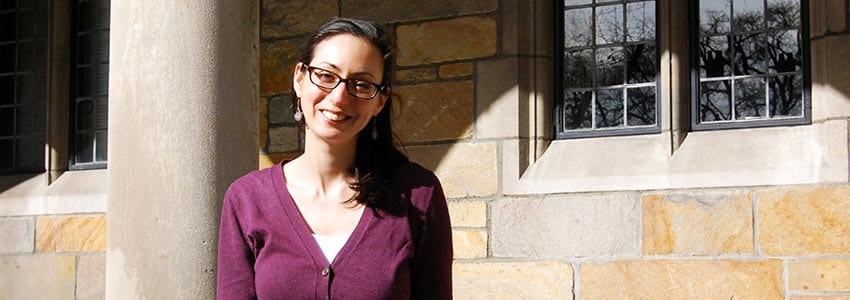In her undergraduate years at U-M, Sarah felt a calling towards public health but didn’t know what aspect was the right fit for her, until she took a women’s reproductive health course, that’s when she knew. She hasn’t looked back. Being a good researcher, she put her new passion to the test by interning at a women’s health advocacy group in Washington DC. “I loved every minute of it. I proved to myself this is what I wanted to do.”
Sarah knew she wanted to pursue a Master’s degree in Public Health. She applied and was accepted broadly, but she felt called to do something different. She received her Master’s in Public Health from the University of Cape Town in South Africa with a focus on reproductive health and HIV.
“That started my trajectory. South Africa offered a perfect example of health and history intersecting to create one of the largest HIV epidemics in the world. During my Master’s, I worked on reproductive health, family planning, and HIV issues in South Africa. After completing my M.P.H., I continued to conduct reproductive health and HIV research in Uganda for two years.” When she moved back to the U.S., Sarah did reproductive health and HIV prevention work at the University of California – San Francisco, focusing on projects in the U.S., Nepal, and Mozambique. She says, “After years of that research, I got to a point where I wanted to ask the questions and pursue different research ideas. That led me back to Michigan for my Ph.D.”
At this point, she had a husband who joined her. “We met at U-M as undergrads, so coming back to Michigan felt like coming home. And coming back more than a decade later was pretty funny and great. We knew what Ann Arbor was like, but it was still so different.”
Sarah is in her 3rd year of the doctoral program in Health Behavior and Health Education. Her research focuses on safer conception for HIV affected couples in Botswana. She explains, “There are a lot of interventions to prevent the spread of HIV from mother to child, and pregnant women are proactive about using them. However, a lot less is done to prevent HIV transmission to HIV-negative partners during conception.”
“When couples want a child, they can’t use a condom, and a lot of people living with HIV are concerned about infecting their partners. For a long time, there wasn’t much they could do: options were often unavailable and cost prohibitive in sub-Saharan Africa. Now we have more options and the use of anti-HIV treatment or antiretrovirals, is especially exciting. If a person living with HIV is on that treatment and they are virally suppressed, their risk of transmitting HIV to partners during unprotected sex is very low. That’s an incredible option. Additionally, if a partner is negative, another option is that the negative partner could take the same drug prophylactically, and by taking the drugs, they can greatly reduce their chance for HIV to gain a foothold in their body if they were exposed.”
She continues, “We’re at a point where we know the science works. However, on the ground, providers often don’t understand that the treatment is that good. And patients also don’t understand it. I think that is why the practice is lagging behind the science. I want to determine how we can improve uptake of safer conception interventions so couples can have children with less fear of HIV transmission.”
Her goal is to develop targeted interventions in Botswana to reduce HIV infections. She says, “Most of the time, women and couples don’t access these services. My question is why and how can we develop interventions to improve uptake. In Botswana, this becomes a policy and advocacy role. Policy needs to change and we need to improve guidelines for providers that normalize conversations about pregnancy among people living with HIV.”
After three months doing pilot qualitative work interviewing policy stakeholders, care providers, and women living with HIV, she’s produced some interesting results. Sarah is now writing her research prospectus for her dissertation and will return to Botswana later in the year for more extensive research.
Sarah is a Rackham Merit Fellow. She says, “Being an RMF, I met so many people in the summer program. Other than the women in my cohort, the people I met there are my closest friends. If it hadn’t been for that, I wouldn’t have met these amazing people from programs all across the university. It can be really easy to get pegged into your department or discipline, and because of the Rackham Merit Fellowship, I have friends in education, political science, American culture, and many other disciples. I have found a really supportive community. That was so important in coming back to Ann Arbor – finding a community of like-minded people who are so supportive of each other’s work. As we move through the stages of graduate school, I continue to see those people. We all want what’s best for each other. They are my Michigan family.”
Sarah is a new mom and much of her fun outside of grad school centers on her daughter. She still squeezes in time for football and hockey games, as she is an avid fan. “The things I do for fun have changed slightly now because of the baby, but I love walking around Ann Arbor, especially the Arb. There are so many great parks and green spaces here.”

